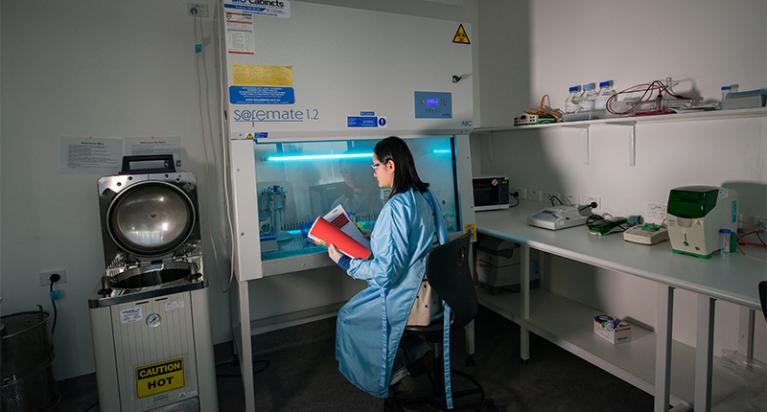Biosafety training
Personnel working with genetically modified organisms, quarantine materials, animals, plants or material that contains biological risk group agents, must be appropriately trained before entry into a biological containment laboratory or commencement of any work.
We offer organisational, lab-specific and project-specific.training required as part of the biosafety training program at VU.
This training is for VU staff and students only.

Organisational training
Organisational biosafety training is provided by Research Services. Training courses must be refreshed every three to five years (depending on the course). An 80% pass on the competency assessment is required for successful completion of the course.
Courses can be accessed by VU staff and postgraduate students through VU Develop's Capability Hub and VU Collaborate. Registration is not required.
Access online organisational training
- Register your details with the Biosafety Manager, :
- given name(s)
- family name
- student/staff number (this training is for VU staff and students only)
- email address.
- Log in to MyVU.
- Select VU Collaborate from the menu bar.
- Select the SPRT Biosafety Course.
- Complete & submit the competency assessment for the units relevant to your appointment.
Any problems, please contact the Biosafety Manager.
Training courses
The following training courses cover legislations and procedures in biosafety:
Lab-specific training
Lab-specific training is provided by the area lab technician and authorised trainers. A record of training is maintained by the Lab Technical Manager, and may be audited by the IBC at any time. Personnel must indicate to the certification holder that they understand their training by signing the training declaration. NB: The Biosafety Team has prepared a number of Lab Safety Guidelines & Checklists to assist in training; these can be found on VU Collaborate.
Audience: Compulsory for personal entering the lab including environmental services, engineering, security, IT and administrative personnel. Training must be arranged prior to commencing work in the lab with the area technician.
Topics covered:
A. General lab induction
- Operational procedures
- Lab safety rules
- Emergency procedures
- Procedures for handling and disposal of waste
- Location of emergency stations and protective equipment.
B. Specific lab induction
High risk areas (e.g. tissue culture labs & animal houses) have specific induction processes where personnel are trained by an authorised trainer to use the facility.
C. Specific equipment induction
An equipment specific training program must be in place in every laboratory (e.g. centrifuge, autoclave, BSC II cabinet etc..). Personnel must be trained by an authorised trainer before they use any equipment.
Project-specific training
It is the responsibility of the project supervisor/subject coordinator to:
- ensure personnel under their supervision attend the required safety training appropriate for the work performed
- ensure that all staff/students are aware and compliant with the relevant OGTR regulations and biosafety guidelines in relation to using biohazards agents and GMOs in their particular projects
- train (or organise the training of) staff/students in project specific activities
- assess the competency of staff in project-specific activities.
Training records must be maintained by the primary investigator and may be requested by the IBC at any time.
Other training opportunities
- Workshops & tutorials are offered as part of VU Biosafety Week in October each year.
- The American Biological Safety Association, Animal Biosafety videos.
- The Victorian Infectious Diseases Reference Laboratory, "Working safely in a Class II Biological Safety Cabinet" video



